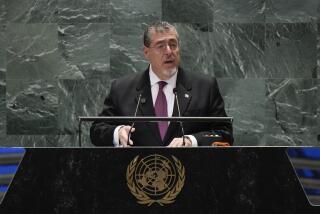Haiti Police on the Run, Rebels or No
PORT-AU-PRINCE, Haiti — Haiti’s poorly trained and equipped police -- accused of brutalizing suspects and trafficking in drugs -- are putting up little resistance as rebels move against the government.
Rebels trying to oust President Jean-Bertrand Aristide launched a bloody uprising two weeks ago, marking the police as prime targets. Of the more than 60 people to die so far, about 40 of them have been police.
“We do not know who we are protecting,” said Cpl. Louis Larieux, 40, a rookie police officer in the capital, Port-au-Prince. “Things are bad. We don’t have the reinforcements.”
Although the police look menacing with their black kneepads, helmets and bulletproof vests, the fear is visible on their faces when dealing with rioters. Confronted by rebels, including ex-soldiers from Haiti’s disbanded army, their inclination has been to run.
Paid the equivalent of $125 a month, they number fewer than 4,000. It’s not known how many remain on the job because droves have abandoned police stations in more than a dozen towns. Previously, about a dozen rebels drove 50 officers out of Hinche in the Artibonite district, where about 1 million of Haiti’s 8 million people live. Last week, police began deserting outlying posts without a guerrilla in sight.
Aristide has conceded that police may not be able to halt the rebellion. He told officers that he was ready to die to defend Haiti and asked them to be courageous. But stony-faced officers did not respond.
In Cap-Haitien, the last major government bastion in the north, officers stripped off their uniforms when word spread that a boat approaching the harbor was filled with rebels. The day after that false alarm, two dozen officers barricaded themselves in their station, leaving the streets to armed Aristide thugs who terrorized the populace.
One officer admitted that they did not have the men or arms to repel a rebel attack and that they were frightened: “Of course we are. It’s a natural reaction after what happened.”
Aristide asked U.S. and Caribbean officials for help “professionalize” the police. But U.S. officials say it was Aristide who politicized the force they helped train: Civilians loyal to Aristide were appointed over professional commanders. Commissioners known to be trafficking in drugs were never punished. Officers have been encouraged to attack anti-government protesters or stand by while Aristide militants attack them.
In August, the National Coalition for Haitian Rights said the government had created special brigades of auxiliaries who rob, rape and murder. The government denied the findings, calling the report a partisan account.
It also defended itself against Amnesty International’s charges that police commit summary executions, make arbitrary arrests and brutalize arrested people.
“The government wants us to protect Aristide, but they don’t tell us why we should. We put our lives in danger, and for what? This killing is senseless,” a Port-au-Prince police corporal said.
More to Read
Sign up for Essential California
The most important California stories and recommendations in your inbox every morning.
You may occasionally receive promotional content from the Los Angeles Times.










